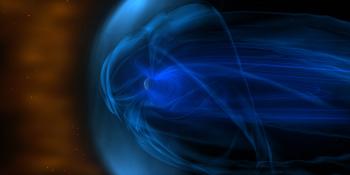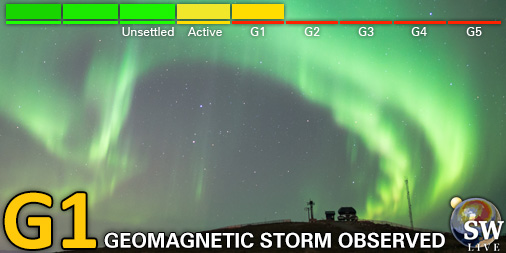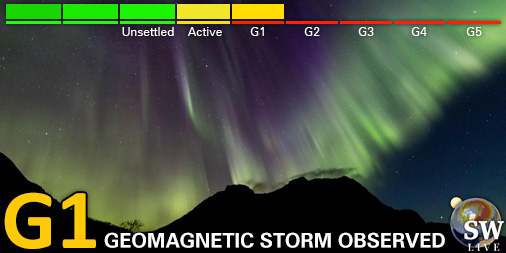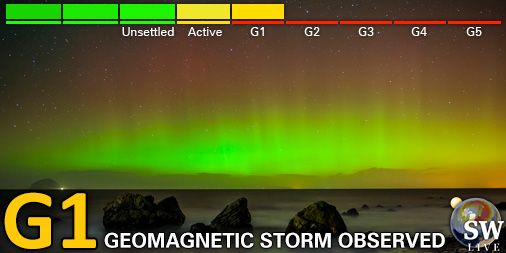Het archief bekijken van donderdag 20 januari 2005
Activiteitenrapport
Bij elke genoemde zonnevlam in dit rapport werd een schaalfactor toegepast door het Space Weather Prediction Center (SWPC). Vanwege de SWPC-schaalfactor worden zonnevlammen 42% kleiner gerapporteerd dan voor de wetenschappelijke data. De schaalfactor werd verwijderd uit onze gearchiveerde zonnevlamdata om de werkelijke fysieke eenheden weer te geven.
Rapport van de zonne- en geofysische activiteit van 2005 Jan 20 2200 UTCOpgemaakt door de NOAA © SWPC en verwerkt door Poollicht.be
USAF/NOAA rapport van de zonneactiviteit en geofysische activiteit
SDF Nummer 020 gepubliceerd omstreeks 2200Z op 20 Jan 2005IA. Analyse van de actieve zonneregio's en zonneactiviteit van 19-2100Z tot 20-2100Z
Solar activity was high. Region 720 (N14W70) produced
an X7/2b flare at 0701 UTC, which was accompanied by Type II and
Type IV radio sweeps. There is one image from the LASCO C2
coronagraph which shows an associated CME off the northwest limb at
0654 UTC. However, shortly after this observation the coronagraph
data became difficult to use due to high levels of energetic
particles. Region 720 continues to be large, with a sheared magnetic
delta configuration along an east-west polarity inversion line.
IB. Voorspelling zonneactiviteit
Solar activity is expected to be
moderate to high. Region 720 continues to have potential for
producing an additional major flare. The location of Region 720 on
the disk also implies that there is a fair chance for more energetic
particles in association with future major flare activity.
IIA. Samenvatting geofysische activiteit 19-2100Z tot 20-2100Z
The geomagnetic field was quiet to active during the past 24 hours.
Solar wind speeds were elevated (700-900 km/s) from the start of the
interval up through at least 0700 UTC, after which the ACE real-time
SWEPAM data became unusable due to elevated energetic particle
flux. The interplanetary magnetic field, however, was weak with
fluctuations between -4 nT to +6 nT. A new injection of protons was
observed at 0650 UTC in association with the X7 flare. The greater
than 100 MeV protons rose rapidly and attained a maximum of 652 PFU
at 0710 UTC. The 100 MeV flux has been declining steadily since
then. This high flux level makes this the largest greater than 100
MeV proton event observed since October 1989. A greater than 10 MeV
proton event was in progress at the time of the new injection, but
the new particles quickly increased the flux from initial values
around 40 PFU to a peak value in the past 24 hours of 1860 PFU at
0810 UTC.
IIB. Voorspelling geofysische activiteit
The geomagnetic field is
expected to be predominantly unsettled to active for the next three
days. Today's CME (associated with the X7 flare) is not expected to
produce anything more than a glancing blow due to its direction away
from the Sun-Earth line. The greater than 10 MeV flux is expected
to remain above event threshold for at least another 24 hours.
III. Kans zonnevlammen van 21 Jan tot 23 Jan
| Klasse M | 90% | 90% | 80% |
| Klasse X | 30% | 30% | 20% |
| Proton | 99% | 80% | 50% |
| PCAF | in progress | ||
IV. Penticton 10.7 cm Flux
Geobserveerd 20 Jan 123 Voorspeld 21 Jan-23 Jan 115/105/095 90 dagen gemiddelde 20 Jan 108
V. Geomagnetische A index
Geobserveerd Afr/Ap 19 Jan 031/062 Geraamd Afr/Ap 20 Jan 012/015 Voorspeld Afr/Ap 21 Jan-23 Jan 015/025-015/020-010/020
VI. Kansen op geomagnetische activiteit van 21 Jan tot 23 Jan
| A. Gemiddelde breedtegraad | |||
|---|---|---|---|
| Actief | 35% | 35% | 20% |
| Kleine storm | 20% | 20% | 15% |
| Zware-ernstige stormcondities | 15% | 15% | 05% |
| B. Hoge breedtegraad | |||
|---|---|---|---|
| Actief | 35% | 35% | 20% |
| Kleine storm | 20% | 20% | 15% |
| Zware-ernstige stormcondities | 15% | 15% | 10% |
Alle tijden in UTC
<< Keer terug naar de dagelijkse overview pagina
Op basis van de huidige parameters is er nu geen kans op poollicht in België en Nederland
Op basis van de huidige parameters is er in de nabije toekomst een beperkte kans op poollicht op de volgende locaties van de hoge breedtegraad
TórshavnLaatste nieuws
Laatste forumberichten
Suggesties? 8Noorderlicht kans 6-1-2025 2Poollicht 1 januari 2025 2Naar Noorwegen in Maart? 3Noorderlicht kans 10/11-10-2024 56
Meer forumberichtenSteun Poollicht.be!
Om ook bereikbaar te blijven bij grote poollichtkansen hebben we een zware server nodig die alle bezoekers aankan. Doneer en steun dit project zodat we online blijven en je geen enkele poollichtkans mist!

Laatste alerts
vrijdag 2 mei 2025
23:30 UTC - Geomagnetische activiteit
G1 - Kleine geomagnetische storm (Kp5) Drempel bereikt: 23:20 UTC
18:15 UTC - Geomagnetische activiteit
G1 - Kleine geomagnetische storm (Kp5) Drempel bereikt: 17:59 UTC
14:45 UTC - Geomagnetische activiteit
G1 - Kleine geomagnetische storm (Kp5) Drempel bereikt: 14:35 UTC
05:15 UTC - Geomagnetische activiteit
G1 - Kleine geomagnetische storm (Kp5) Drempel bereikt: 04:59 UTC
02:00 UTC - Geomagnetische activiteit
G1 - Kleine geomagnetische storm (Kp5) Drempel bereikt: 01:55 UTC
Ruimteweer feitjes
| Laatste X-klasse uitbarsting | 28/03/2025 | X1.1 |
| Laatste M-klasse uitbarsting | 30/04/2025 | M2.03 |
| Laatste geomagnetische storm | 01/05/2025 | Kp5 (G1) |
| Zonnevlekkenloze dagen | |
|---|---|
| Laatste zonnevlekkenloze dag | 08/06/2022 |
| Maandelijks gemiddeld zonnevlekkengetal | |
|---|---|
| april 2025 | 140.6 +6.4 |
| mei 2025 | 59 -81.6 |
| Afgelopen 30 dagen | 119.8 -10.8 |







